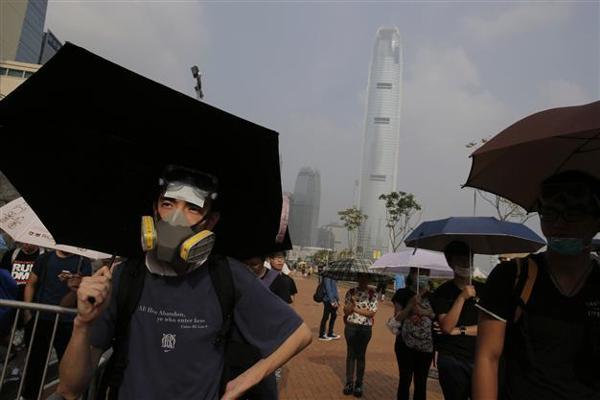Hong Kong protest groups vow to call off talks after violent clashes
HONG KONG- Reuters


A protester wears mask outside the office of Chief Executive Leung Chun-ying in Hong Kong, Friday, Oct. 3, 2014. AP Photo
Hong Kong pro-democracy protest leaders vowed to call off talks with the government Friday unless "organised attacks" on supporters stop, as ugly and chaotic scenes broke out at previously peaceful demonstrations in the city.Opposition groups clashed with the pro-democracy protesters in one of Hong Kong's busiest shopping districts, with the activists saying they believed the violence had been orchestrated by hired hands brought in to stir up trouble.
The three main protest groups issued a statement late Friday calling for the government to step in.
"If the government does not immediately prevent the organised attacks on supporters of the Occupy movement, the students will call off dialogue on political reform with the government," they said in a statement.
Talks had been promised by Hong Kong's Chief Executive Leung Chun-ying, who is under pressure from protesters to resign as they demand democratic reforms, but there was no sign Friday that they had begun as tensions sharply rose.
Thousands of people crowded the streets as demonstrators faced off against a group of anti-protesters in shopping district Mong Kok after they started to dismantle barricades in an apparent backlash against the protests.
Police tried to hold back angry demonstrators who surrounded the pro-democracy protesters at a junction they had been occupying for five days. Some students backed away toward an underground rail station, while others were driven back by cheering groups.
One small group chanted "I want genuine democracy", while a crowd yelled at them to "Go home!" as police struggled to contain the confrontation.
"I don't support Occupy Central. We have to work and make money. Occupy is just a game," said a construction worker who gave his name as Mr Lee.
"Give us Mong Kok back, we Hong Kongers need to eat!" yelled another man removing the barricades there.
Individuals from both sides pushed and shoved each other as water bottles were thrown, and one anti-Occupy protester chanted: "Beat them to death, good job police!"
Police urged all sides to "stay calm and exercise restraint" in what they described in a statement as a "chaotic situation" in Mong Kok.
There were also confrontations in the busy commercial district of Causeway Bay.
One anti-protester there yelled: "This is not democracy, we need to feed our kids". Spectators cheered barricades being taken away.
The clashes took place as the city returned to work after a two-day public holiday.
Store owners have told of a massive downturn in business after days of demonstrations. "I supported (the pro-democracy activists) at first but when they escalated their action, they have gone too far," said Janice Lamb, 54, an onlooker in Causeway Bay.
Hong Kong Finance Secretary John Tsang warned that if the unrest persists, the city's status as one of the world's most important trading hubs could be under threat.
"If this situation were to persist we're going to see some damage to our system," he told a press conference.
He added that extended protests could seriously dent "confidence in the market system in Hong Kong -- that would bring permanent damage that we could not afford".
Leung described the protests as "close to anarchy" after an ambulance was blocked from leaving government offices on Friday morning.
"As a civilised society, we cannot let these incidents continue to happen," the city's chief executive said.
While the United States, Europe and Japan have all expressed their concern at the scenes playing out in one of the world's leading financial capitals, China insisted that there was "no room to make concessions on important principles".
On August 31, China said Hong Kongers would be able to vote for their next chief executive in 2017 -- but that only candidates vetted by a loyalist committee would be allowed to stand, a decision dismissed as "fake democracy" by campaigners.
Demonstrators had set a midnight Thursday ultimatum for Leung to resign and for Beijing to abandon the proposals to vet candidates.
Leung refused to quit, but in a dramatic televised appearance shortly before the midnight deadline he appointed his deputy to sit down with a prominent students' group that has been at the vanguard of the protests.
Mistrust was rife that Leung was merely trying to buy time in the hope that the Hong Kong public will tire of the disruption caused by the mass sit-ins.
